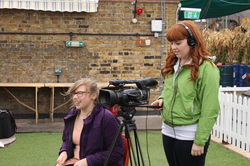
June 15, 2014
Keep Calm and Appreciate Food
By Taylor Lunka
LONDON, England – The “Waste Not” team, the first in MediaLab history to perform research overseas, arrived safely in the United Kingdom on Sunday, June 15.
On Monday the 16th, we hit the ground running by interviewing Dominika Jarosz, events coordinator for Feeding the 5000, an initiative established and organized by British author and food waste activist Tristram Stuart that focuses on upstream food waste.
Stuart wrote “Waste: Uncovering the Global Food Scandal,” which received the 2011 Sophie Prize, an international environmental award. Feeding the 5000 also brings food waste related projects together to bring more awareness to the issue.
“Food waste can be seen as a solution,” Jarosz said. “There’s plenty of solutions.”
One solution Jarosz suggested is a “Disco Soup,” which is an event at which people gather to cook food for those in need while disco music plays in the background.
“Food is becoming a movement,” Jarosz said.
We also interviewed Amy Leech, coordinator of a campaign called the Pig Idea, a program associated with Feeding the 5000 that calls for feeding food waste to animals.
“Pigs and chickens are perfect recyclers of food waste,” said Leech, who said “a lot of farmers and retailers don’t know what to do with their food waste.”
After the two interviews, we followed Jarosz, Leech and others from Feeding the 5000 to a London event called the “Race Against Food Waste.” The evening included a pay-as-you-feel up buffet from food that would’ve otherwise been wasted and live music.
The next day we visited Moshi Moshi, a sushi restaurant in London that is a member of the Sustainable Restaurant Association. At the restaurant, we met with Victoria Moorhouse, senior operations and SRA program manager, who discussed the role that restaurants play in the food cycle.
“Restaurants have a great part to play,” Moorhouse said. “Portion size is a problem.”
As we have heard at various points along the way, portions at restaurants often go uneaten. The SRA sponsors a program called FoodSave, which helps restaurants reduce the amount of food they waste.
FoodSave uses technology that calculates the quantity of waste as well as what specific kind of food is thrown into the trash.
Moorhouse also highlighted why many people are unaware of the scale of food waste.
“Food waste is something we don’t talk about,” Moorhouse said.
Organizations such as the SRA aim to change the perceptions of UK residents, and perhaps someday, the perceptions of consumers around the world.
We also talked with Kevin Duffy, a representative from Winnow Solutions, the London-based company that provides food waste technology and analytics for Moshi Moshi and other UK restaurants.
Keep Calm and Appreciate Food
By Taylor Lunka
LONDON, England – The “Waste Not” team, the first in MediaLab history to perform research overseas, arrived safely in the United Kingdom on Sunday, June 15.
On Monday the 16th, we hit the ground running by interviewing Dominika Jarosz, events coordinator for Feeding the 5000, an initiative established and organized by British author and food waste activist Tristram Stuart that focuses on upstream food waste.
Stuart wrote “Waste: Uncovering the Global Food Scandal,” which received the 2011 Sophie Prize, an international environmental award. Feeding the 5000 also brings food waste related projects together to bring more awareness to the issue.
“Food waste can be seen as a solution,” Jarosz said. “There’s plenty of solutions.”
One solution Jarosz suggested is a “Disco Soup,” which is an event at which people gather to cook food for those in need while disco music plays in the background.
“Food is becoming a movement,” Jarosz said.
We also interviewed Amy Leech, coordinator of a campaign called the Pig Idea, a program associated with Feeding the 5000 that calls for feeding food waste to animals.
“Pigs and chickens are perfect recyclers of food waste,” said Leech, who said “a lot of farmers and retailers don’t know what to do with their food waste.”
After the two interviews, we followed Jarosz, Leech and others from Feeding the 5000 to a London event called the “Race Against Food Waste.” The evening included a pay-as-you-feel up buffet from food that would’ve otherwise been wasted and live music.
The next day we visited Moshi Moshi, a sushi restaurant in London that is a member of the Sustainable Restaurant Association. At the restaurant, we met with Victoria Moorhouse, senior operations and SRA program manager, who discussed the role that restaurants play in the food cycle.
“Restaurants have a great part to play,” Moorhouse said. “Portion size is a problem.”
As we have heard at various points along the way, portions at restaurants often go uneaten. The SRA sponsors a program called FoodSave, which helps restaurants reduce the amount of food they waste.
FoodSave uses technology that calculates the quantity of waste as well as what specific kind of food is thrown into the trash.
Moorhouse also highlighted why many people are unaware of the scale of food waste.
“Food waste is something we don’t talk about,” Moorhouse said.
Organizations such as the SRA aim to change the perceptions of UK residents, and perhaps someday, the perceptions of consumers around the world.
We also talked with Kevin Duffy, a representative from Winnow Solutions, the London-based company that provides food waste technology and analytics for Moshi Moshi and other UK restaurants.
